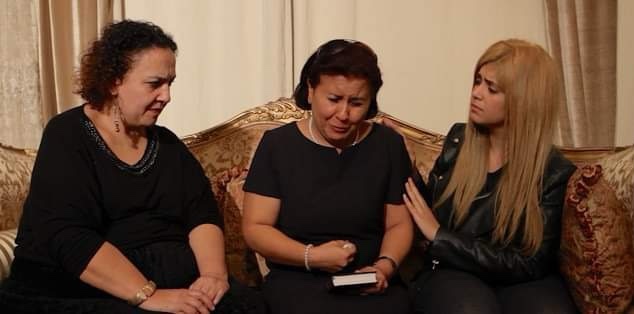How are young Egyptians doing today? Egyptian film students answer that question in “Behind High Walls”, but the answer is nothing short of a depressing look at reality.
The result of a mysterious potential overdose and a series of unfortunate events ranging from the aftermath of a revolution and a romantic failure, the short film takes place entirely at a funeral, narrated by 20-something-year-old Karim, the deceased.
Directed by Frank Bartscheck and produced by Tania Kamaleldin and students from the American University in Cairo, the film had two exclusive virtual premieres on YouTube last week.
The eerie social commentary is led by actor Tayam Amar, who plays Karim from beyond the grave. Karim comes over as a little too confident for comfort for a dead person and has seemingly made peace with his own tragic death.
The red-lit cinematography adds to the uncomfortable mood, and the use of dripping water on his face is a fitting metaphor for the holistic tone of the short.

Despite being completed in 2018, the experimental student film encompasses class, grief, post-revolutionary trauma and political divide in a short single-setting film.
Karim’s friends and family reunite at home, some crying, some reminiscing, but there is a clear distinction between his family and his more recent friends that he met in protests, with very present tension between them.
“We live behind high walls to keep poverty out, and luxury in,” says Karim to the viewers from beyond the grave – making meaning of the film title.
For a look at modern Egypt, we’re introduced to Karim’s parents – representing old Egypt and New Egypt respectively, with a father that went through the Nasser regime and a mother that came from money.
But despite the money and the high walls, Karim could not escape Egypt and what it represented to him.
Perhaps the most unnerving character of the film is Suliman, the family’s contractor – a man bold enough to bash a man at his own funeral. Suliman is only paying his dues to the family but behind closed doors he would say that Karim thought he understood everything. He was an “activist”.
Suliman is a cliche of the Egyptian older generations that undermine the youth, thinking they’re rebels without a cause. The film impressively unpacks an entire generation’s thought in this one character, but the mindset is transcended to younger relatives in the family, the ‘snobs’, played by Dalia Shawky and Morgane Abou Ali.
While Karim’s mother is part of this generation, she only remembers him fondly, with the occasional reminder to his brother Adam, played solemnly by Pola Kamel, not to turn out like him.

Scenes are interwoven with ghostly chants from Karim’s past including “Raise your head up high, you’re Egyptian” and the like, majorly contrasting his own narrative that indicates that it was his country that led to his demise.
“It’s hard being a young man in an arab country,” the film is an ode to the ‘Arab’ Spring which ranges much further than Egypt and its own events. The film is likely to ring true for Arabs across the region who lived through the past decade, privileged or not.
Karim’s past lover Sarah makes an emotional appearance, with an unprecedented touching moment with Aisha, the family maid. Conversations on the balcony between Karim’s most recent friends indicate that his experience with Sarah was part of his emotional downfall, along with drugs.
The film brilliantly expresses a sad reality that isn’t told often for Egypt’s youth. It is even more remarkable as a mark in history that documents a time that was not documented freely otherwise, for people for years in the future to look back at.
The 10-minute short has already been showcased at several film festivals in Canada, India, the Philippines and the UK with official selections in several festivals. It is not currently available for viewing but will be made available publically online in the future.






Comments (3)
[…] fjs.parentNode.insertBefore(js, fjs); }(document, 'script', 'facebook-jssdk')); Source link try { window._mNHandle.queue.push(function (){ window._mNDetails.loadTag("376662536", "728×90", […]
[…] fjs.parentNode.insertBefore(js, fjs); }(document, 'script', 'facebook-jssdk')); Source link Please follow and like […]